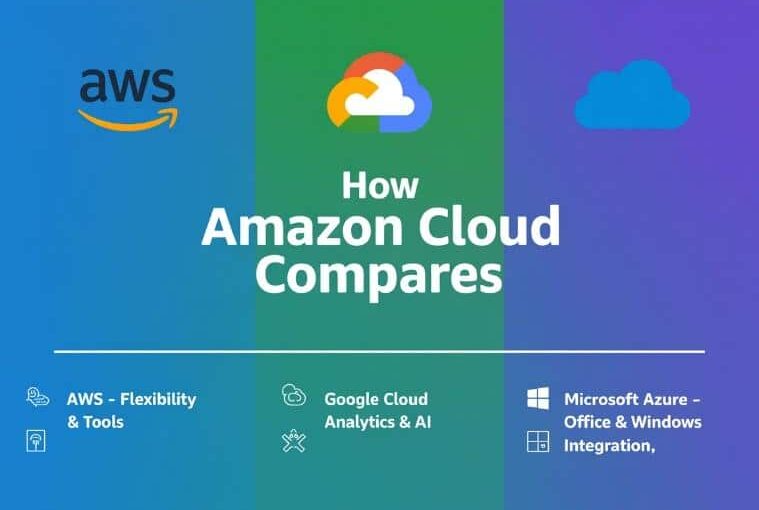When people hear “Amazon,” they usually think of shopping online. However, in reality, this company has developed into one of the most important platforms for cloud computing, thanks to the tools it has created for using Amazon Web Services (AWS) as facilities through which a business can easily store data, host websites or apps, and scale quickly.
This is one huge segment in the giant cloud industry, and if you want to put your business online in the cloud, learning about this name is important. Once you learn, it will help you make the choice for the best layout required for your setup. For someone very new to finding out what cloud services really is, knowing how these kinds of platforms as Amazon facilitate business growth is a great start.
What Is Amazon Web Services (AWS)?
AWS is the cloud computing platform of Amazon. It has more than 200 products and services on the cloud. It incorporates a variety of servers, storage, networking, and analytics applications. Instead of necessarily purchasing hardware, businesses could rent access to the global infrastructure through Amazon itself.
Think of AWS as a toolbox. Be it hosting websites, backing up files, or developing a mobile application, there is a tool for each need. And because it runs on the cloud, everything is accessible online, anytime, from anywhere.
Key Features of Amazon Cloud Services
Scalability and Flexibility
One of the most remarkable advantages of AWS is its ease of scaling. Whether you are a startup or an enterprise, you can always make small beginnings and grow big. There is no concern regarding purchasing servers because it is done with a few clicks of a button to scale up resources.
This links to what we mentioned previously in our post about infrastructure cloud services—Amazon gives you the backend power without the physical burden of infrastructure.
Pay-as-You-Go Pricing
AWS is wallet-friendly, with users paying only for what they use. When traffic peaks, like during the holidays, you can scale up accordingly. Thereafter, scale down. There are no long-term commitments or huge upfront expenses.
Global Infrastructure
Amazon has data centers scattered all over the world. This results in better performance, reduced latency, and improved overall end-user experience—no matter where the actual user is sitting. Therefore, your business can go global without having to set up offices in each and every country.
Strong Security
AWS has built-in security, including encryption, firewalls, access controls, and periodic audits. These provide assurance of compliance with industry standards.
Common Use Cases for Amazon Cloud Services
Web Hosting
Many websites use AWS with services such as EC2 (virtual servers) and S3 (file storage). Whether it’s a blog or an online store, AWS can run your site.
App Development
AWS is much favored among developers for one reason: they have full control. They can build custom apps and test them, then take features into production-all under the same roof. This kind of flexibility is what cloud computing is often referred to.
Data Storage and Backup
This is the sort of thing AWS specializes in — data storages, securing files, data backup with recovery plans. Tools like S3, Glacier, and RDS give you options for both short- and long-term storage.
Business Tools
Amazon’s cloud platform has reasonable tools for business-oriented tasks, including data analytics, workflow automation, and machine learning, which enhance daily operations and decision-making processes.
Many of the tools which businesses use for daily operations, such as data analytics and automation, are built on AWS, just like we’ve seen in the case of IT cloud services.
Real-World Examples of AWS in Action
Let’s see how real companies make the most of Amazon Cloud Services:
- Software Development: Software Development: A dev team operates virtual servers on AWS EC2, builds custom applications, and performs traffic management all by themselves – from setup through scaling. This is a perfect example of how Amazon Cloud Services powers cloud computing.
- Ecommerce: An online store using Cloud Services because they can handle loads of traffic during the Black Friday period. Expansion at peak periods and contraction during off-peak times save them money.
- Startups: A small startup that creates and tests a prototype mostly on a free tier of AWS so that there is little out of pocket incurred. Payments can be made later, once they have grown, by upgrading services with just a few clicks.
How Amazon Cloud Compares to Other Providers
Amazon is a leader in the cloud world, but it’s not the only option. You may also hear about Microsoft Azure and Google Cloud Services. Each provider has its strengths:

- AWS is known for flexibility and a wide range of tools.
- Google Cloud is strong in analytics and AI.
- Microsoft Azure integrates well with Office and Windows systems.
Understanding these differences can help you choose the right one. If you’re comparing platforms, understanding what each provider offers – like scalability, support, or pricing – can help you find the best match for your business.
Is Amazon Cloud Services Right for You?
AWS is a great choice if:
- You want control over your setup
- You expect to grow and need to scale fast
- You want flexible pricing without long contracts
However, AWS might feel complex for beginners. That’s why understanding the difference between cloud computing and cloud services is key. If you only need ready-made tools, you might be better off with a service that’s easier to manage.
Getting Started with Amazon Cloud Services
Initiating your path with AWS is not as tough as it sounds. Make your free account. Now, you can try several basic services at no cost. From there, you can explore EC2, S3, RDS, and other things.
There is also the free tier in Amazon that covers a lot of the services. That is really the best way to experiment before going for a paid plan. Once you get used to the dashboard, you’ll see how flexible and powerful this platform will be.
Final Thoughts
Amazon Cloud Services are the basic building blocks for empowering businesses in building, scaling, and growth. Whether it is a company that is hosting a simple website, has an app to develop, or needs backups, AWS has a suitable solution.
This is placed within the larger cloud movement that changes how a business runs. It has made growth easier without hard investments on hardware by alters such as AWS, Google Cloud, and Azure.
So if you are looking to eliminate slow tools and expensive setups, then you should try Amazon Cloud Services for this switch.

